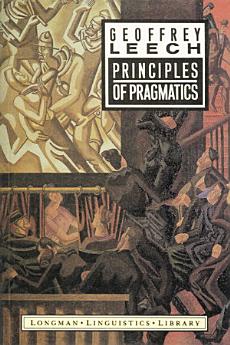Principles of Pragmatics
ກ.ພ. 2016 · Routledge
3,0star
1 ຄຳຕິຊົມreport
ປຶ້ມອີບຸກ
264
ໜ້າ
family_home
ມີສິດ
info
reportບໍ່ໄດ້ຢັ້ງຢືນການຈັດອັນດັບ ແລະ ຄຳຕິຊົມ ສຶກສາເພີ່ມເຕີມ
ກ່ຽວກັບປຶ້ມ e-book ນີ້
Over the years, pragmatics - the study of the use and meaning of utterances to their situations - has become a more and more important branch of linguistics, as the inadequacies of a purely formalist, abstract approach to the study of language have become more evident. This book presents a rhetorical model of pragmatics: that is, a model which studies linguistic communication in terms of communicative goals and principles of 'good communicative behaviour'.
In this respect, Geoffrey Leech argues for a rapprochement between linguistics and the traditional discipline of rhetoric. He does not reject the Chomskvan revolution of linguistics, but rather maintains that the language system in the abstract - i.e. the 'grammar' broadly in Chomsky's sense - must be studied in relation to a fully developed theory of language use. There is therefore a division of labour between grammar and rhetoric, or (in the study of meaning) between semantics and pragmatics.
The book's main focus is thus on the development of a model of pragmatics within an overall functional model of language. In this it builds on the speech avct theory of Austin and Searle, and the theory of conversational implicature of Grice, but at the same time enlarges pragmatics to include politeness, irony, phatic communion, and other social principles of linguistic behaviour.
In this respect, Geoffrey Leech argues for a rapprochement between linguistics and the traditional discipline of rhetoric. He does not reject the Chomskvan revolution of linguistics, but rather maintains that the language system in the abstract - i.e. the 'grammar' broadly in Chomsky's sense - must be studied in relation to a fully developed theory of language use. There is therefore a division of labour between grammar and rhetoric, or (in the study of meaning) between semantics and pragmatics.
The book's main focus is thus on the development of a model of pragmatics within an overall functional model of language. In this it builds on the speech avct theory of Austin and Searle, and the theory of conversational implicature of Grice, but at the same time enlarges pragmatics to include politeness, irony, phatic communion, and other social principles of linguistic behaviour.
ການຈັດອັນດັບ ແລະ ຄຳຕິຊົມ
3,0
1 ຄຳຕິຊົມ
ກ່ຽວກັບຜູ້ຂຽນ
Geoffrey N. Leech
ໃຫ້ຄະແນນ e-book ນີ້
ບອກພວກເຮົາວ່າທ່ານຄິດແນວໃດ.
ອ່ານຂໍ້ມູນຂ່າວສານ
ສະມາດໂຟນ ແລະ ແທັບເລັດ
ຕິດຕັ້ງ ແອັບ Google Play Books ສຳລັບ Android ແລະ iPad/iPhone. ມັນຊິ້ງຂໍ້ມູນໂດຍອັດຕະໂນມັດກັບບັນຊີຂອງທ່ານ ແລະ ອະນຸຍາດໃຫ້ທ່ານອ່ານທາງອອນລາຍ ຫຼື ແບບອອບລາຍໄດ້ ບໍ່ວ່າທ່ານຈະຢູ່ໃສ.
ແລັບທັອບ ແລະ ຄອມພິວເຕີ
ທ່ານສາມາດຟັງປຶ້ມສຽງທີ່ຊື້ໃນ Google Play ໂດຍໃຊ້ໂປຣແກຣມທ່ອງເວັບຂອງຄອມພິວເຕີຂອງທ່ານໄດ້.
eReaders ແລະອຸປະກອນອື່ນໆ
ເພື່ອອ່ານໃນອຸປະກອນ e-ink ເຊັ່ນ: Kobo eReader, ທ່ານຈຳເປັນຕ້ອງດາວໂຫຼດໄຟລ໌ ແລະ ໂອນຍ້າຍມັນໄປໃສ່ອຸປະກອນຂອງທ່ານກ່ອນ. ປະຕິບັດຕາມຄຳແນະນຳລະອຽດຂອງ ສູນຊ່ວຍເຫຼືອ ເພື່ອໂອນຍ້າຍໄຟລ໌ໄໃສ່ eReader ທີ່ຮອງຮັບ.








